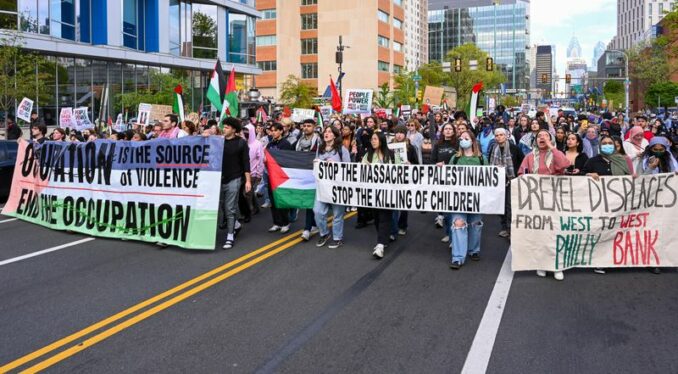

Students from Philadelphia campuses march from City Hall to UPenn prior to the encampment, April 25, 2024. WW Photo: Joe Piette
Philadelphia
Joining around 80 college campuses across the United States, University of Pennsylvania students, faculty and staff established a Penn for Palestine encampment on the campus April 25 to demand: the administration disclose what companies they have invested billions of endowment funds in and that they divest from any that do business with Israel.


Students from Philadelphia campuses march from City Hall to UPenn prior to the encampment, April 25, 2024. WW Photo: Joe Piette
Earlier in the day, demonstrators marched from Philadelphia City Hall, led by students from Temple University and activists with the Philadelphia Palestine Coalition to UPenn. En route to UPenn, several hundred people marched through Center City and received an overwhelmingly positive and supportive response from people along the route. They stopped for a short rally at Drexel University, where the students and staff joined them to proceed to UPenn, where supportive faculty members were waiting.


Penn for Palestine encampment, Philadelphia, April 26, 2024. WW Photo: Joe Piette
Toward the end of the rally on College Green in the heart of the UPenn campus, as police and campus security were facing the speakers, several students quickly moved in behind security and strategically placed pop-up tents on the lawn in front of the administration building. Other students linked arms and surrounded the encampment, while still others hung banners.
Students draped a statue of Benjamin Franklin, credited with starting the school, with keffiyehs and other Palestinian garb.
UPenn’s interim President J. Larry Jameson issued an email the next morning saying the university was closely monitoring the encampment, but would intervene “if protected protest and speech deteriorate into words and actions that violate Penn’s policies … or contribute to an intimidating or hostile environment on our campus.”
By early evening, administrators claimed that minor vandalism had damaged the Franklin statue and that some students reported being intimidated by the protesters, although no specific incidents were reported. A memo went out to students demanding they disband the encampment by midnight. Students held their ground and with extra movement security continued to occupy the area for the next two days.
Relay races at Penn
The university hosted the Penn Relay races over the weekend, so it was unlikely the administration would use Philadelphia police against students on campus just blocks from Franklin Field, where high school athletes and their families were gathered.
Over the weekend, participants in the encampment held teach-ins as the numbers of tents grew, and supporters brought food, water and other supplies. New encampments were also established at Haverford, Bryn Mawr and Swarthmore colleges in the suburbs of Philadelphia, and a peaceful march was held at the University of Delaware.
At noon on April 28, a few dozen Zionists with Israeli flags showed up at UPenn to protest for about 20 minutes but left when it was clear they were getting no reaction other than media coverage.
Later in the afternoon, Families for Ceasefire and Jewish Voice for Peace, which had scheduled an open Seder for outside City Hall, relocated to the encampment, where several hundred people participated. During the Seder, a Zionist began circulating through the crowd, clearly displaying a large knife and threatening people near him.
Eventually, cops removed the knife, only because encampment security demanded it. Yet police continued to accompany and protect the aggressor’s provocative movement through the family-focused event which was celebrating the traditional Jewish Passover meal.
Despite what was overall a very peaceful day, by early evening students again received notice to vacate. Within hours, over 500 supporters turned out to defend the encampment.
Penn for Palestine
Just a week before the start of the encampment, UPenn administration banned Penn Students Against the Occupation from campus. Students quickly reorganized as Penn for Palestine, charging the university with being shamefully complicit with Israel for over 75 years of occupation and apartheid, including 200 days of genocide in Gaza.
The encampment, which includes students from Drexel and Temple, is demanding that UPenn disclose the individual donors and active financial holdings under the university’s $21 billion endowment. The second demand is that UPenn divest financially from corporations that profit from Israel’s war on Gaza and occupation in Palestine. This includes Ghost Robotics, created by UPenn graduates and housed in the university’s Pennovation facility, which developed drone-mounted and armed robot dogs used by Israel in Gaza and at the U.S. border with Mexico.
A final demand is to defend Palestinian students on campus, granting amnesty for those involved in pro-Palestine protests and ending the university’s repression and biased disciplinary targeting, beginning with the reinstatement of Penn Students Against the Occupation (PAO).
Note: Despite repeated threats from campus administrators to disband, as of the morning of April 30, encampment participants are determined to remain until their demands are met.
Boston Baristas at Blue Bottle coffee shops in Boston are so fed up with their…
En su continua campaña genocida contra el pueblo palestino, Israel utilizó aviones no tripulados el…
Israeli military veteran in Warsaw: ‘Liberate all ghettos’ By Michael Kramer On the 82nd anniversary…
The Vietnamese revolution to liberate its country from imperialism had a decisive victory 50 years…
The epic struggle of the Palestinian people against the full weight of U.S. imperialism and…
The following report comes from the Bronx Anti-War Coalition organizers on a protest held in…